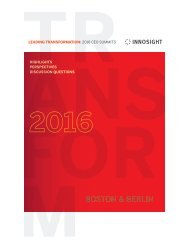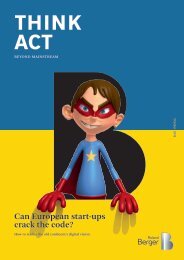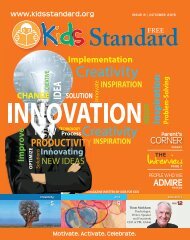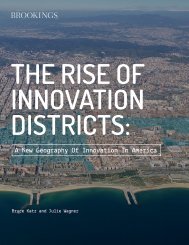TECHNOLOGY AT WORK
1Oclobi
1Oclobi
Create successful ePaper yourself
Turn your PDF publications into a flip-book with our unique Google optimized e-Paper software.
February 2015<br />
Citi GPS: Global Perspectives & Solutions<br />
91<br />
Online learning can both reduce costs and<br />
improve the quality of education<br />
Despite its positive impact, online education<br />
will unlikely be a full substitute for oncampus<br />
teaching<br />
necessarily completing a standardised academic programme, MOOCs can provide<br />
modularised approaches to education that appeal to employers looking to retrain<br />
their workforce.<br />
Online learning does not only offer the potential to reduce costs, it can also help<br />
improve the quality of education. With more students signing up, big data<br />
approaches make it easier to evaluate the students’ learning process, and measure<br />
their progress. This success has been partially due to new structural innovations,<br />
particularly the semi-synchronous nature of the courses, but future prospects rest<br />
upon MOOCs' increasing use of data and machine learning algorithms. MOOCs<br />
already make use of big data detailing how students interact on forums, their<br />
diligence in completing assignments and viewing lectures, and their ultimate<br />
grades. 149 This data will ultimately allow for algorithms that act as interactive tutors,<br />
with teaching and assessment strategies statistically calibrated to match individual<br />
student needs. 150 These advances will permit the global access to high quality,<br />
interactive, education that is needed to prepare students for the future workforce.<br />
A recent study comparing a MOOC in physics at the Massachusetts Institute of<br />
Technology (MIT) to its equivalent on-campus course on the same subject found<br />
that the MOOC student actually learned more than they normally would during a<br />
regular lecture. 151 Nevertheless, MOOC students compared poorly in group work,<br />
suggesting that interactive face-to-face learning methods are still important in<br />
fostering many of the soft skills demanded by employers.<br />
Online education is thus unlikely to fully substitute for on-campus teaching. Physical<br />
interactions between students (and between students and teachers) are likely to<br />
become even more important, as social, creative and problem-solving skills will be<br />
essential in most developed labour markets. Nevertheless, as online courses<br />
provide unprecedented access to knowledge at much lower costs, and improved<br />
methods of learning, the productivity gains will likely be substantial.<br />
149 Simonite (2013); Breslow et al., (2013).<br />
150 Woolf (2010).<br />
151 Colvin et al. (2014).<br />
© 2015 Citigroup










